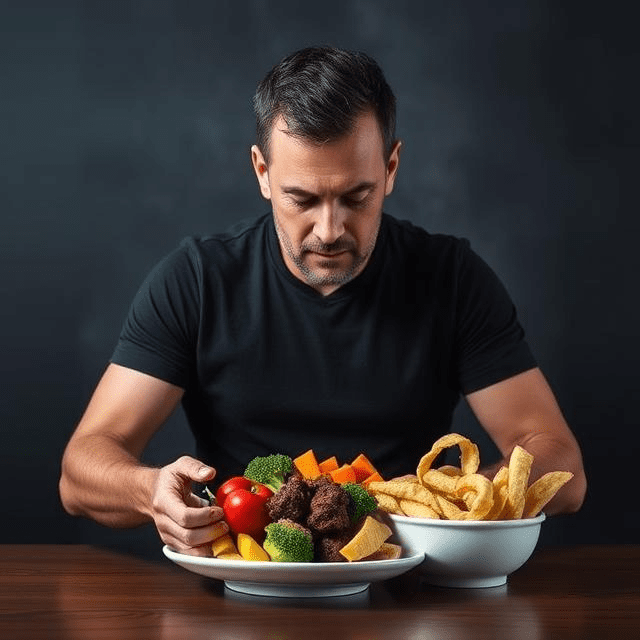Around 30 million men in the U.S. alone struggle with erectile dysfunction (ED), which can be caused by anything from cardiovascular disorders to psychological stress. Lifestyle factors such as smoking and inactivity are well-known risk factors, but diet is a critical — and, all too often, overlooked — determinant of sexual health. Emerging research suggests that certain foods slow blood flow, disrupt the balance of hormones and affect nerve function — all essential for getting and keeping erections.
In the ultimate guide, we’ll break down the worst foods for erectile dysfunction and identify foods that cause male impotence, supported by clinical studies and expert insights. You’ll discover actionable alternatives to safeguard your vascular health and sexual vitality.
1. Processed Meats: The Silent Killers of Circulation
What Makes Processed Meats Harmful?
Processed meats like bacon, sausages, and deli slices are loaded with saturated fats, sodium, and preservatives like nitrates. These ingredients wreak havoc on endothelial function—the inner lining of blood vessels responsible for regulating blood flow.
- Science note: Saturated fats increase LDL cholesterol, which damages blood vessels and reduces nitric oxide production—a molecule essential for erections.
- Saturated Fats: A study published in the American Journal of Clinical Nutrition found that men who consumed high amounts of processed meats had a 30% higher risk of sperm quality decline compared to those who ate plant-based diets. These fats promote atherosclerosis (plaque buildup in arteries), narrowing blood vessels and reducing penile blood flow.
- Nitrates: To extend shelf life, nitrates convert to nitric oxide inhibitors in the body, counteracting the molecule’s role in vasodilation.
Scientific Evidence
A 2023 meta-analysis published in NIH linked processed meat consumption to a 15% higher risk of cardiovascular events, a primary driver of ED.
Alternatives to Processed Meats
- Grilled Chicken or Turkey: Opt for unprocessed, lean cuts.
- Plant-Based Proteins: Lentils, chickpeas, and tempeh are fibre-rich and contain antioxidants.
2. Sugary Foods and Beverages: The Blood Sugar Rollercoaster
How Sugar Sabotages Erections
Sugary snacks, sodas, and refined carbs (white bread, pastries) spike blood sugar levels, leading to insulin resistance and type 2 diabetes. Diabetes damages blood vessels and nerves, contributing to ED.
- Why it matters: Chronic high blood sugar reduces endothelial function, impairing penile blood flow.
Key Studies
- According to a study in Diabetes Care, men with diabetes are three times more likely to experience ED than those without.
- A 2022 study by the European Academy of Andrology showed that reducing sugar intake improved erectile function in diabetic men by 24% over six months.
Healthier Sweet Alternatives
- Berries: Blueberries and strawberries are low-glycemic and rich in anthocyanins, which boost nitric oxide.
- Dark Chocolate (70%+ Cocoa): Contains flavonoids that improve blood flow.
3. Trans Fats and Fried Foods: Artery-Clogging Villains
The Trans Fat- ED Connection
Trans fats in margarine, fried chicken, and doughnuts lower HDL (“good” cholesterol) and inflame blood vessels. This inflammation impairs endothelial function, reducing blood flow to the penis.
- A Harvard Health study linked trans fats to a 25% higher ED risk in men under 45.
- Fried foods also contain acrylamide, a carcinogen that induces oxidative stress, further damaging vascular health.
Alternatives for Heart-Healthier Cooking
- Olive or Avocado Oil: High in monounsaturated fats, which reduce LDL cholesterol.
- Air-Fried Vegetables: A crunchy substitute for fries.
4. High-Sodium Foods: The Blood Pressure Booster
Sodium’s Impact on Erectile Health
Excess sodium from canned soups, frozen pizzas, and soy sauce raises blood pressure, straining blood vessels and reducing nitric oxide availability. Hypertension is present in 30% of ED cases and accelerates arterial stiffness.
Research Highlights
A 2019 study published in the Journal of Nutrients found that men who reduced sodium intake by 25% saw a 9% improvement in erectile function scores.
Low-Sodium Swaps
- Herb-Infused Dishes: Use rosemary, thyme, or turmeric instead of salt.
- Homemade Broths: Control sodium levels by avoiding store-bought versions.
5. Alcohol: The Double-Edged Sword
How Alcohol Affects Testosterone and Nerves
While moderate red wine consumption may benefit circulation, excessive alcohol suppresses testosterone production and damages the peripheral nerves involved in erections. Chronic heavy drinking is tied to a 60-70% higher ED risk.
The Science of Moderation
- A research in the American Psychological Association review noted that 1-2 drinks daily had neutral effects, but exceeding this threshold impaired sexual function.
Better Beverage Choices
- Pomegranate Juice: Boosts nitric oxide by 18%.
- Green Tea: Rich in catechins that improve endothelial function.
6. High-Mercury Fish: Hidden Hormone Disruptors
Mercury’s Impact on Testosterone
Large fish like swordfish and king mackerel accumulate mercury, a neurotoxin that lowers testosterone and sperm quality. A Journal of Andrology study linked mercury exposure to a 32% decline in erectile function scores.
Safer Seafood Choices
- Wild-Caught Salmon: High in omega-3s, which reduce arterial inflammation.
- Sardines: Low in mercury and rich in CoQ10, a nutrient that enhances blood flow.
7. Soy-Based Products: The Phytoestrogen Problem
Soy and Hormonal Imbalance
Soy contains isoflavones and plant estrogens that may reduce testosterone in high doses. A 2020 study found that men consuming 56g of soy daily had 41% lower testosterone levels than controls.
- Fermented Soy: Tempeh and miso have lower isoflavone concentrations.
- Diversify Proteins: Combine soy with eggs or quinoa.
8. Licorice: The Testosterone Killer
Glycyrrhizin’s Hormonal Effects
Liquorice root contains glycyrrhizin, which inhibits testosterone synthesis and raises cortisol. A steroid trial found that daily liquorice consumption reduced testosterone by 26% in healthy men.
Alternatives for Flavor
- Cinnamon: Enhances insulin sensitivity and blood flow.
- Mint: A refreshing, hormone-safe herb.
9. Refined Carbohydrates: Empty Calories, Empty Results
The Blood Sugar-ED Link
White bread, pasta, and pastries cause rapid glucose spikes, triggering inflammation and oxidative stress. The American Journal of Clinical Nutrition study tied refined carbs to a 92% higher ED risk in men under 60.
Whole-Grain Alternatives
- Quinoa: High in magnesium, which relaxes blood vessels.
- Oatmeal: Stabilizes blood sugar with soluble fibre.
10. Excessive Caffeine: The Anxiety Amplifier
Caffeine’s Dual Role
While moderate coffee intake (1-2 cups daily) improves circulation, exceeding 500mg of caffeine daily (5+ cups) raises cortisol and anxiety, which can inhibit erections.
- A Psychopharmacology study linked high caffeine intake to temporary ED in men with anxiety disorders.
Calming Substitutes
- Chamomile Tea: Reduces anxiety and inflammation.
- Matcha: Provides steady energy without jitters.
Building an ED-Fighting Diet: What to Eat Instead
Top Nutrients for Erectile Health
- L-arginine: This amino acid boosts nitric oxide in nuts and seeds.
- Omega-3s: Fatty fish like salmon reduce arterial plaque.
- Antioxidants: Berries and dark leafy greens combat oxidative stress.
Sample Meal Plan
- Breakfast: Spinach omelette with avocado.
- Lunch: Grilled salmon salad with olive oil dressing.
- Dinner: Lentil stew with quinoa and steamed broccoli.
Lifestyle Synergy: Beyond Diet
- Exercise: Aerobic activity improves blood flow; aim for 150 minutes weekly.
- Sleep: Poor sleep lowers testosterone; prioritize 7-9 hours nightly.
- Stress Management: Yoga and meditation reduce cortisol spikes.
Conclusion
Avoiding the worst foods for erectile dysfunction isn’t just about sexual health—it’s a gateway to overall vitality. Eating whole foods, healthy fats, and plant sources rich in antioxidants can improve your vascular system, balance hormones, and restore self-assurance in the bedroom. Consult a health care provider for individualized strategies.
Frequently Asked Questions
Can a poor diet alone cause ED?
A: While diet isn’t the sole factor, it significantly exacerbates risks when combined with sedentary lifestyles, smoking, or obesity.
How quickly can dietary changes improve ED?
A: Studies suggest improvements in erectile function can occur within 3–6 months of adopting a heart-healthy diet.
Are “natural” sugars (e.g., honey) safer than refined sugar?
A: All sugars in excess can harm metabolic health—moderation is key.



